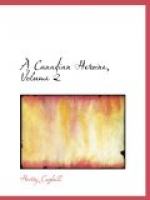The younger girl had wrapped herself in a great shawl, and hurried off to school; the elder one was occupied at the further end of the room, making bread of Indian meal, and baking it in thin cakes upon the stove. Mr. Strafford was with the invalid, and the mother and daughter sat silently at the window and watched. The afternoon advanced. The American clock struck one quarter after another. It was already half-past four. Mr. Strafford came back; but, seeing the absorbed attitude of Mrs. Costello, he would not disturb her, and the silence continued. At last she moved. She had been looking, with intense eagerness, at one point far away in the distance. She turned round to Mr. Strafford.
“Look!” she said; “it is a sail.”
He rose, and looked as she pointed.
“I see nothing,” he answered.
“Lucia!” she said impatiently, “can’t you see it?”
But Lucia shook her head. She had fancied several times already that she saw something.
Mrs. Costello said no more just then. A minute or two afterwards, however, she spoke still more positively.
“It is a boat with two sails. It is coming down quickly now. They must have waited for the storm to be over.”
Next moment the others saw something faintly marked against the horizon. It was a sail.
But Mrs. Costello either was gifted with longer sight, or her excitement sharpened her faculties. She declared that it was certainly the expected boat; it was one, she knew well, and could recognize distinctly.
They began to speculate as to the time of its arrival; and while they spoke, still watching eagerly, they did not notice how the sky darkened. The horizon still remained light; it even grew brighter; but the brightness was only a line, surrounded with a silvery border; the black cloud spread out overhead. By-and-by the wind began to rise again in long, wailing blasts, as it had done that morning. The edges of the cloud seemed to be torn into long, jagged fringes, and there fell sharp, momentary showers of snow and sleet, hissing as they touched the water. The boat came on fast now; but at intervals it was hidden; once, when a denser obstacle than usual of rain and drift and frosty mist had come between it and the land, there appeared in the lull that followed another object much further away, but moving down the river also. It was a large steamer coming down from the lakes, and hurrying on before the storm.
Again the distance was hidden. Again, after a longer interval, the two boats were seen—the small one tacking from side to side, using every contrivance to hasten its course, and reach the port; the other holding steadily and swiftly on its way.
But as the wind increased there came with it a dense fog. Gradually it settled down over the river and then the wind sank, blowing only, as at first, in single gusts, which wailed horribly round the house and through the trees about it. There was nothing to see now, but still the three kept their places at the window, and hoped the fog might rise if but for a moment, and show them where the boat was.




